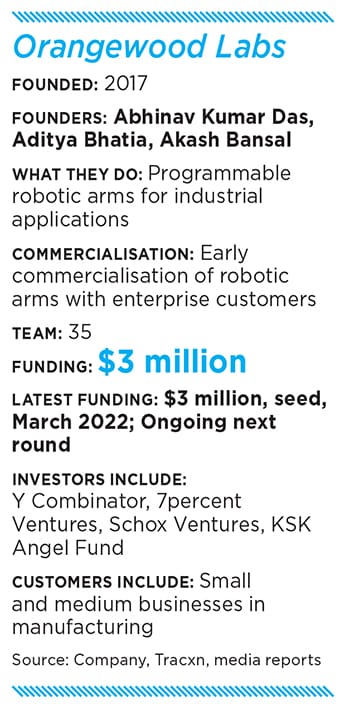How RoboGPT is making robotic arms affordable for SMEs
The company's subscription plans make its robotic arms affordable for small- and medium-sized businesses, and is getting a good response in the US


An early description of Orangewood Labs by Tracxn, a private markets intelligence provider, was “manufacturer and distributor of customised furniture". That was how this innovative robotics company started out.
And furniture-making was what threw up some frustrations—time-consuming sandblasting, powder coating and other processes, including visual inspection—that the founder trio Aditya Bhatia, Abhinav Kumar Das and Akash Bansal tried to solve with a “side project", as Bhatia called it.
He had studied industrial design, specialising in furniture, from India’s premier design school National Institute of Design, Ahmedabad. Das used to build trucks for rural areas in a previous venture and Bansal knew finance. Their first idea of a tech platform that facilitated quick design and customisation of furniture won them a place in the winter 2018 cohort of Y Combinator. “Then, we realised that the problem is even bigger because manufacturing is tough and getting skilled labour even more so," Bhatia recalls.
 So, in 2019, the “side project" robotic arm became the main business for Orangewood Labs. Today, the robotic arm, which they just call “Bro" and haven’t gone beyond that in terms of branding, is available as a subscription, and the entrepreneurs have developed an early software solution that can be used to remotely programme the arms with natural-language (ML) commands. For example, “Bro, change the colour from red to blue."
So, in 2019, the “side project" robotic arm became the main business for Orangewood Labs. Today, the robotic arm, which they just call “Bro" and haven’t gone beyond that in terms of branding, is available as a subscription, and the entrepreneurs have developed an early software solution that can be used to remotely programme the arms with natural-language (ML) commands. For example, “Bro, change the colour from red to blue."
The entrepreneurs call this software, RoboGPT. “It’s basically a chatbot for robots," Bhatia says. They’ve also developed patented tech with the hardware, including a way to use ML with the gears to prevent whiplash, Bhatia says. The arm operates with six degrees of freedom and it’s “almost like the human hand", he says. It can lift payloads of up to 5 kg.
The San Francisco and Noida venture has partnered with Viam, which provides a data management software platform for smart machines, and PickNik.ai, which offers a sophisticated open source-based software platform for developing robotics applications.
Orangewood’s business model is about offering the robotic arms on subscription plans, making them affordable even for small- and medium-sized businesses. Currently, there is good response in the US, in the range of $1,500 to $2,000 per month per robot, Bhatia says. “For most businesses that we’re targeting, Bro will be their first robot ever in their setting," he says, while they may have used other machines.
Orangewood recently raised $4.5 million in funding and the round is still open, Bhatia says. The company also has “soft commitments" for up to $10 million. The money will help the venture produce its first 1,500 to 1,800 robotic arms. Manufacturing is a mix of sourcing some components from China, some fabrication at a contract manufacturer and in-house assembly.
“Our long-term vision is to produce the robots in-house completely."
First Published: Oct 18, 2023, 11:31
Subscribe Now